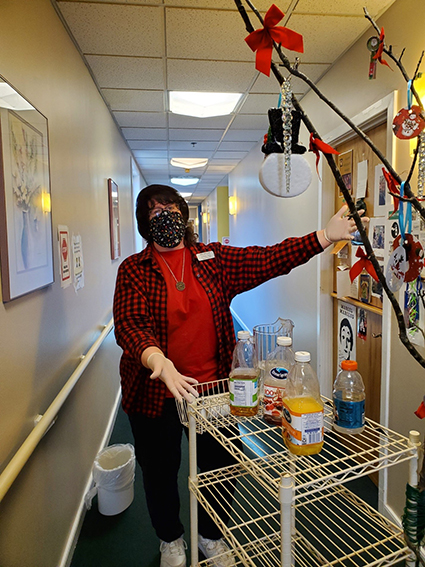FEBRUARY 1, 2021
Every Drop Counts
Hydration in the elderly
 As people age, their risk for dehydration increases in part because their bodies hold less water. An elderly person weighing 150 pounds has about seven liters LESS water than a young person of the same weight.[1] As a result of this lower water content, seniors can become dehydrated more quickly.
As people age, their risk for dehydration increases in part because their bodies hold less water. An elderly person weighing 150 pounds has about seven liters LESS water than a young person of the same weight.[1] As a result of this lower water content, seniors can become dehydrated more quickly.
They also tend to feel less thirsty and may refuse any offer of a drink, declaring “I’m not thirsty” or “I’ve already had too much to drink today.” Many incorrectly believe that drinking less will reduce accidents (from incontinence) or bathroom trips.
Older adults who are obese, bedridden, taking several prescription medicines, or have swallowing disorders are at increased risk of dehydration.
Fluid imbalance can occur quickly and can be life threatening. Watch for early signs of dehydration including[2]:
- confusion
- dry skin, eyes, or mouth
- cracked lips
- decreased blood pressure
- increased pulse rate
- dark/yellow urine
- unexplained weight loss
- dizziness/falls.
A 2015 study found that 37% of people (age 65 years and older) admitted to emergency rooms showed signs of dehydration.[3] Since many of these symptoms can have other causes, staying hydrated can help lead to a correct diagnosis by ruling out dehydration as a possible cause.
So let’s make hydration fun. Here are a few ideas:
- Instead of asking, “Would you like a drink?” say, “Here is some cool, refreshing water for you.”
- Instead of soda, offer sparkling water.
- Keep cold water in a pretty pitcher.
- Hold an afternoon tea time, juice break, cocktail hour, or even Happy Hour.
- Use real glasses (if possible) decorated with a slice of fruit on the rim. Make water a tasty treat by adding lemon slices or raspberries with a sprig of mint leaves.
- For those with disabilities, consider long flexible straws and spouted or two-handled cups.
- Give medication with a full glass of water.
- Make hydration a social event; this encourages people to drink more. Create activities like a taste test, where everyone guesses the flavor of the juice, soft drink, or shake.
Hint: Frequent drinks in small quantities are generally better (and more enjoyable!) than infrequent large quantities.
Though water is the best choice, hydration can come from other sources. Don’t forget about milk, juice, and shakes. Many foods provide liquid too; fruits (e.g., melons, peaches, and oranges) and vegetables (e.g., cucumbers, tomatoes, and lettuce) are excellent sources[4]. Use a blender to mix endless delicious combinations like kiwi and strawberry, vanilla and root beer soda, ginger ale and cranberry juice, and orange with pineapple juice. Stay away from drinks with caffeine and/or alcohol as they have dehydrating properties.
Hydration can boost a person’s mood, reduce confusion and fatigue, prevent headaches, and protect against diseases such as urinary tract infections, constipation, kidney stones, and heart disease.[5] Every drop counts!
[1] http://www.nursinghome.org/fam/fam_018.html
[2] https://universityhealthnews.com/daily/nutrition/confused-about-how-much-water-to-drink-a-myth-vs-reality-check/
[3] https://www.ncbi.nlm.nih.gov/pmc/articles/PMC4621229/
[4] https://www.healthline.com/nutrition/19-hydrating-foods#TOC_TITLE_HDR_15
[5] https://universityhealthnews.com/daily/nutrition/why-is-drinking-water-important-6-reasons-to-stay-hydrated/

Winter Growth’s founder dreamed of creating a community where seniors and adults with disabilities could continue to learn and grow—filling their lives with joy and purpose. For over 40 years, we have fulfilled her vision by providing unique, affordable Assisted Living/Memory Care and Adult Medical Day Care tailored to our clients’ individual abilities, interests, and lives.


I didn’t realize how easily an older person can become dehydrated. Thanks for the information!